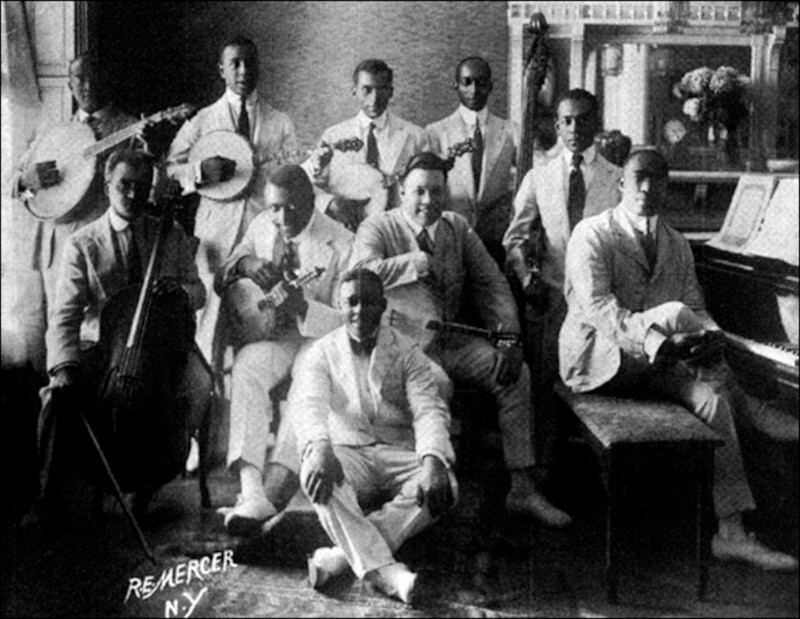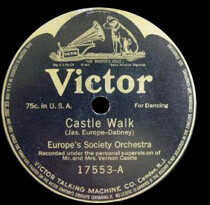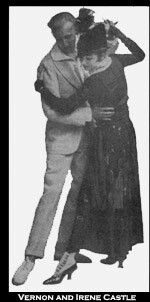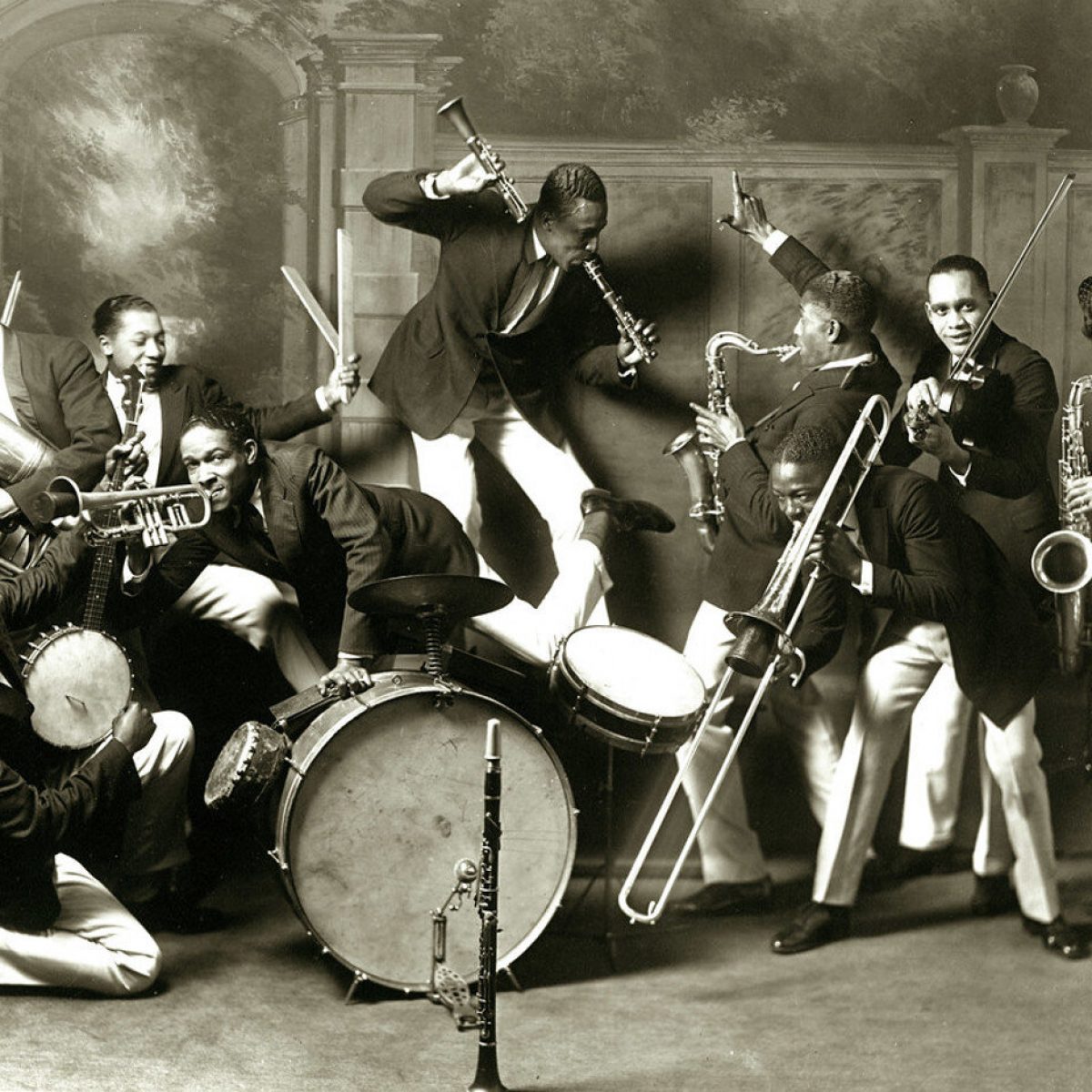
Vernon and Irene Castle were dancers who made a name for themselves in Europe performing Ragtime dances like the Texas Tommy, the Turkey Trot and the Grizzly Bear in front of a wealthy, continental crowd. They returned to America in the fall of 1913 and found that social dancing was the rage; their act went over well among the wealthy elite in New York City.
The dances that the Castles (who were White) performed were of African-American origin and required syncopated music of a type that few New York bands were playing at the time. After seeing James Reese Europe’s Society Orchestra perform at a private party in the Fall of 1913 Vernon asked if Europe would be interested in accompanying the Castles’ dance exhibitions. He accepted the offer and Europe’s band began providing the music for the Castles’ act.
 The Castles were hot and opened a dance school called The Castle House and also a supper club called San Souci. Both ventures were quite successful and Europe’s Society Orchestra provided the music. This led to Europe’s Society Orchestra being offered a recording contract with Victor records which resulted in the recordings on this page. This was the first time that an African-American Orchestra was offered a contract with a major American record company.
The Castles were hot and opened a dance school called The Castle House and also a supper club called San Souci. Both ventures were quite successful and Europe’s Society Orchestra provided the music. This led to Europe’s Society Orchestra being offered a recording contract with Victor records which resulted in the recordings on this page. This was the first time that an African-American Orchestra was offered a contract with a major American record company.
 In January of 1914 the Castles landed an engagement at the Palace Theater and Hammersteins’ Victoria Theatre in New York City. These venues were considered the height of show business at the time. A problem arose when the segregated musician’s union objected to Europe’s Society Orchestra (who were African-American) performing in the orchestra pit with the regular White orchestra. The Castles insisted that Europe’s Orchestra accompany them and solved the racial impasse by having the band sit on-stage rather than in the orchestra pit. This was the first time that an African-American orchestra performed at the first class New York Vaudeville theatres.
In January of 1914 the Castles landed an engagement at the Palace Theater and Hammersteins’ Victoria Theatre in New York City. These venues were considered the height of show business at the time. A problem arose when the segregated musician’s union objected to Europe’s Society Orchestra (who were African-American) performing in the orchestra pit with the regular White orchestra. The Castles insisted that Europe’s Orchestra accompany them and solved the racial impasse by having the band sit on-stage rather than in the orchestra pit. This was the first time that an African-American orchestra performed at the first class New York Vaudeville theatres.
The music of Europe’s Society Orchestra is not Jazz, it is Ragtime. Nevertheless, Europe was an important transitional figure in the development of Jazz. He broke down racial barriers and helped to popularize African-American musical styles in New York City in the years before World War I. James Reese Europe would achieve even greater recognition during and after World War I with his 369th Infantry “Hellfighters” Band. See: Lt. James Reese Europe: Songs Brought Back from the Battlefield
Thanks to Carl Rose and Stephen Galleher for their help with this page.

| Title | Recording Date | Recording Location | Company |
| Amapa – Maxixe Bresilien (Le Vrai) (Juca Storoni) |
12-29-1913 | New York, New York | Victor 35369-B |
| Castle House Rag (Castles In Europe) (James Reese Europe) |
2-10-1914 | New York, New York | Victor 35372-B |
| Castle’s Lame Duck (James Reese Europe) |
2-10-1914 | New York, New York | Victor 35372-A |
| Castle Walk (James Reese Europe / Ford Dabney) |
2-10-1914 | New York, New York | Victor 17553-A |
| Down Home Rag (Wilbur Sweatman) |
12-29-1913 | New York, New York | Victor 35359-B |
| El Irresistible – Tango Argentine (Lorenzo Logatti) |
12-29-1913 | New York, New York | Victor 35369-A |
| Too Much Mustard (Cecil Macklin) |
12-29-1913 | New York, New York | Victor 35359-A |
| You’re Here And I’m Here (from “Laughing Husband”) (Jerome D. Kern) |
2-10-1914 | New York, New York | Victor 17553-B |
| Artist | Instrument |
| Edgar Campbell | Clarinet |
| Tracy Cooper | Violin |
| James Reese Europe | Leader |
| Buddy Gilmore | Drums |
| Ford Dabney | Piano |
| Walker Scott | Violin |
| Cricket Smith | Cornet |
| George Smith | Violin |
| Leonard Smith | Piano |
| 5 unknown | Banjo |
| A Life In Ragtime; A Biography of James Reese Europe, by R. Reed Badger, Oxford University Press, 1995 |
| The Product of Our Souls: Ragtime, Race, and the Birth of the Manhattan Musical Marketplace , by David Gilbert, University of North Carolina Press, 2015 |
Redhotjazz.com was a pioneering website during the "Information wants to be Free" era of the 1990s. In that spirit we are recovering the lost data from the now defunct site and sharing it with you.
Most of the music in the archive is in the form of MP3s hosted on Archive.org or the French servers of Jazz-on-line.com where this music is all in the public domain.
Files unavailable from those sources we host ourselves. They were made from original 78 RPM records in the hands of private collectors in the 1990s who contributed to the original redhotjazz.com. They were hosted as .ra files originally and we have converted them into the more modern MP3 format. They are of inferior quality to what is available commercially and are intended for reference purposes only. In some cases a Real Audio (.ra) file from Archive.org will download. Don't be scared! Those files will play in many music programs, but not Windows Media Player.





















